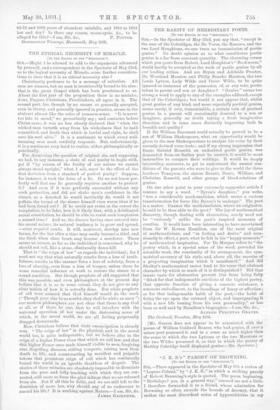THE RARITY OF HEREDITARY POETS. [to THE EDITOR or THE
" EIPECTLTOR."] SIR,—In the Spectator of May 23rd, you say that, "except in the case of the Coleridges, the De Veres, the Roscoes, and the two Lord Houghtons, we can trace no transmission of poetic genius." No doubt opinion as to what constitutes poetic genius is a far from constant quantity. The charming verses which you quote from Robert, Lord Houghton's" Bookworm," would hardly be accepted as the work of poetic genius by all our leading critics. And are Bryan and Adelaide Procter, Dr. Westland Marston and Philip Bourke Marston, the two Lords Lytton, Lady Wilde and Oscar Wilde, to be quite ignored as instances of the possession of, at any rate, poetic talent in parent and son or daughter P " Genius " seems too strong a word to apply to any of the examples adduced, except that of the Coleridges ; but would it not appear that, whilst great genius of any kind, and more especially poetical genius, seems rarely, if ever, transmissible, a certain vein of poetical genius in a parent will occasionally descend to a son or daughter, generally no doubt taking a fresh imaginative direction, and in some cases distinctly improving both In breadth and quality?
If Sir William Davenant could actually be proved to be a son of William Shakespeare, what an opportunity would be given to the new Shakespearians to analyse his verse by their recently devised verse-tests ; and if my strong impression that Dante Gabriel Rossetti, an undoubted poetic genius, was descended from an Italian poet be correct, it would be most instructive to compare their writings. It would be deeply interesting, moreover, to get to understand the mental con- ditions of the parents who were to give to the world the three brothers Tennyson, the sisters Brontë, Dante, William, and Christina Rossetti, and other groups of blood-relations of genius.
On one other point in your extremely suggestive article venture to say a word. " Byron's daughter," you write, "was a considerable mathematician, which seems a curious transformation for force like Byron's to undergo." The poet is a maker. Cannot the mathematician, where an originator, be said to be thus akin to the poet ? The joy of mathematical discovery, though dealing with abstraction, surely need not be " curiously " unlike the poet's inspired moments of creation. It would have been interesting to have ascertained from Sir W. Rowan Hamilton, one of the most original of mathematicians, and "in feeling and desire," and occa- sionally in effect, a poet, what he felt in his " happy moments" of mathematical inspiration. For De Morgan refers to "the poetry which, in a special sense of the word, pervaded his scientific work, the conainnity of its arrangement, the sym- metrical accuracy of his style, and, above all, the exercise of a projecting imagination which it manifested." And did Shelley's mathematical tastes lend to his verse that abstract character by which so much of it is distinguished ? Did that innate taste for abstraction prevent him from being fully "fitted for that indispensable attribute of the highest poetry, that opposite function of giving a concrete substance, a sensuous embodiment, to the broodings of fancy or affection; or for that indispensable habit of the poet,—the habit of fixing the eye upon the outward object, and impregnating it with a new life issuing from his own personality," as has been so well said by Hamilton's biographer.—I am, Sir, Sze., ALFRED PERCEVAL GRAVES.
The Orchard, Taunton, May 26th.
Dir. Graves does not appear to be acquainted with the poems of William Caldwell Roscoe, who had genius, if ever a. minor poet possessed it, and in a sense as much higher than the sense in which the two Lyttons or the two Marstons or the two Wildes possessed it, as that in which the poetry of Hartley Coleridge itself displayed genius—ED. Spectator.]






































 Previous page
Previous page